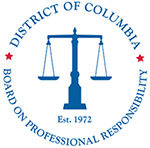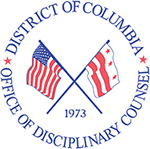- For the Public
- For Lawyers
- Board on Professional Responsibility
- Office of Disciplinary Counsel
- Disciplinary Decisions
-
Attorney Discipline News
- Administrative Order 2020-8: Live Streams of Hearing Committee Proceedings
- Administrative Order 2023-1: Return to In-Person Proceedings
- The Court of Appeals Makes Appointments to the Board on Professional Responsibility
- Amendments to the Rules of the Board on Professional Responsibility
- Amendments to the Rules of the Board on Professional Responsibility
- Volunteer Opportunities
From Washington Lawyer, February 2013
By Bill Ross
When suspending or disbarring an attorney from the practice of law, the District of Columbia Court of Appeals always reminds the disciplined attorney to comply with D.C. Bar R. XI, § 14. This is not a hollow requirement; it serves several important purposes.
First, the rule protects clients, the public, and the courts by requiring that the attorney notifies clients and opposing parties of his or her inability to continue with the representation in both litigated and nonlitigated matters, requiring the attorney to return client papers and property promptly, and also requiring the attorney to move to withdraw from all proceedings pending before a D.C. court or agency.
Second, complying with the rule is a precondition to reinstatement: Not only does D.C. Bar R. XI, § 16 (Reinstatement) preclude reinstatement if the attorney has not yet filed an affidavit complying with the requirements of D.C. Bar R. XI, § 14, that affidavit determines the effective date of the suspension or disbarment for purposes of calculating an attorney’s eligibility for reinstatement. In addition to being the right thing to do, complying with the rule’s obligations is in the best interest of a suspended or disbarred attorney. Obeying the rules is always a good first step.
There are other requirements that must be satisfied in a Section 14 affidavit. The affidavit must be accompanied by supporting proof demonstrating compliance such as copies of any notices sent to clients or motions to withdraw filed in court. The suspended or disbarred attorney must provide the address to be used while he or she is unable to practice law as well as acknowledge the obligation to keep the Bar apprised of any change of address. Additionally, the attorney must include a list of all jurisdictions where he or she is licensed to practice law.
So what does it all mean? An attorney’s first priority should always be to protect his or her clients, even when facing suspension or disbarment from the practice of law. Further, D.C. Bar R. XI, § 14 ensures that protecting those interests is also in the attorney’s best interests because filing the required affidavit is what starts the time running for purposes of reinstatement. If an attorney is suspended for 30 days but fails to file a Section 14 affidavit, that attorney will never be reinstated.[1]
Every time an attorney is suspended or disbarred, our office forwards the attorney (or his or her counsel) a copy of the pertinent Bar rules, the rules of the Board on Professional Responsibility, and a model Section 14 affidavit. The court has explained that compliance with the affidavit requirement is solely the responsibility of a suspended or disbarred attorney because an “attorney can be expected to ascertain on his or her own the provisions of our disciplinary rules, especially when the order of suspension particularly calls the section 14 requirements to the attorney’s attention.” In re Slosberg, 650 A.2d 1329, 1331 n.7 (D.C. 1994).
While we cannot provide legal advice, our office is available to assist attorneys in understanding the obligations of Section 14 and to explain our position regarding an attorney’s efforts to comply. D.C. Bar R. XI, § 14 is not intended to be a trap for the unwary; it is a crucial part of the attorney discipline system that ensures that clients, the courts, and the legal profession are protected.
Bill Ross serves as assistant bar counsel.
Note
[1] All too often, attorneys appear years after being suspended or disbarred only to learn that the time for reinstatement has not yet even started running because they never complied with Section 14.
Disciplinary Actions Taken by the Board on Professional Responsibility
Original Matters
IN RE CHARLES F. DAUM. Bar No. 952481. November 16, 2012. The Board on Professional Responsibility recommends that the D.C. Court of Appeals disbar Daum as a result of his conviction in the U.S. District Court for the District of Columbia of three counts of obstruction of justice in violation of 18 U.S.C. § 1503, one count of conspiracy to obstruct justice in violation of 18 U.S.C. §§ 371 and 1503, and two counts of subornation of perjury in violation of 18 U.S.C. § 1622, crimes involving moral turpitude per se for which disbarment is mandatory under D.C. Code § 11-2503(a) (2001).
IN RE MATTHEW F. SHANNON. Bar No. 218651. November 27, 2012. The Board on Professional Responsibility recommends that the D.C. Court of Appeals suspend Shannon for 90 days. Shannon violated multiple Rules of Professional Conduct in connection with estate planning services he rendered to an elderly client. Specifically, Shannon failed to provide competent representation and failed to serve his client with the skill and care generally afforded to clients by other lawyers; failed to set forth in writing within a reasonable time after commencing representation that he would not charge for his services or costs; failed to advise his client to seek the advice of independent counsel and proceeded without his client’s consent before he obtained a joint tenancy in his client’s house; prepared a testamentary instrument giving himself a substantial gift; failed to maintain complete records of the property in his possession (specifically documents relating to the transfers of his interests in his client’s real property) for a period of five years after termination of the representation; and failed to maintain complete records of the handling, maintenance, and disposition of all funds, securities, and other properties belonging to another person while in his possession, from the time of receipt to the time of final distribution, and failed to preserve such records for a period of five years after final distribution of such properties. Rules 1.1(a), 1.1(b), 1.5(b), 1.8(a), 1.8(b), and 1.15(a) and D.C. Bar R. XI, § 19(f).
Disciplinary Actions Taken by the District of Columbia Court of Appeals
Reciprocal Matters
IN RE MICHAEL W. COOPET. Bar No. 392884. November 29, 2012. In a reciprocal matter from Minnesota, the D.C. Court of Appeals imposed identical reciprocal discipline and suspended Coopet for 36 months with fitness.
IN RE SUSAN A. FRIERY. Bar No. 446623. November 29, 2012. In a reciprocal matter from Massachusetts, the D.C. Court of Appeals imposed identical reciprocal discipline and suspended Friery for two years, nunc pro tunc to February 2, 2012. In Massachusetts, Friery was found to have falsely represented that she had graduated from medical school and was a medical doctor.
IN RE RANJI M. GARRETT. Bar No. 469682. November 29, 2012. In a reciprocal matter from Maryland, the D.C. Court of Appeals imposed identical reciprocal discipline and disbarred Garrett. In Maryland, Garrett was found to have engaged in conduct that included dishonesty and misappropriation of funds.
IN RE JOSHUA J. R. GESSLER. Bar No. 474109. November 29, 2012. In a reciprocal matter from Virginia, the D.C. Court of Appeals imposed functionally identical reciprocal discipline and disbarred Gessler. In Virginia, Gessler consented to revocation based upon his guilty plea to possession of child pornography and to contributing to the delinquency of a minor.
IN RE ERWIN R. E. JANSEN JR. Bar No. 477715. November 29, 2012. In a reciprocal matter from Maryland, the D.C. Court of Appeals imposed identical reciprocal discipline and disbarred Jansen. In Maryland, Jansen consented to disbarment based upon allegations that he had misused fiduciary and client funds.
IN RE PETER R. MAIGNAN. Bar No. 461974. November 29, 2012. In a reciprocal matter from Maryland, the D.C. Court of Appeals imposed identical reciprocal discipline and disbarred Maignan. In Maryland, Maignan was found to have engaged in misconduct, including unauthorized practice of law and dishonesty.
IN RE LOUIS P. TANKO JR. Bar No. 434000. November 29, 2012. In a reciprocal matter from Maryland, the D.C. Court of Appeals imposed identical reciprocal discipline and indefinitely suspended Tanko from the practice of law, with the opportunity to petition for reinstatement in five years or upon his reinstatement in Maryland. In Maryland, Tanko was found to have engaged in misconduct, including unauthorized practice of law and mishandling of unearned fees.
Disciplinary Actions Taken by Other Jurisdictions
In accordance with D.C. Bar Rule XI, § 11(c), the D.C. Court of Appeals has ordered public notice of the following nonsuspensory and nonprobationary disciplinary sanctions imposed on D.C. attorneys by other jurisdictions. To obtain copies of these decisions, visit www.dcbar.org/discipline and search by individual names.
IN RE DANIEL K. CHRISTENSEN. Bar No. 454346. On October 1, 2012, the Oregon State Disciplinary Board publicly reprimanded Christensen.
Informal Admonitions Issued by the Office of Bar Counsel
IN RE JOHN J. KLUSARITZ. Bar No. 358549. October 25, 2012. While representing a corporate client in a variety of legal matters, Klusaritz failed to communicate with the corporate client and engaged in a conflict of interest when he failed to obtain informed consent from the corporate client before providing legal advice to the client’s employee, who was starting a business that could potentially compete with the corporate client. Rules 1.4(b), 1.7(b), and 1.7(c).
The Office of Disciplinary Counsel compiled the foregoing summaries of disciplinary actions. Informal Admonitions issued by Disciplinary Counsel and Reports and Recommendations issued by the Board on Professional Responsibility are posted at www.dcattorneydiscipline.org. Most board recommendations as to discipline are not final until considered by the court. Court opinions are printed in the Atlantic Reporter and also are available online for decisions issued since August 1998. To obtain a copy of a recent slip opinion, visit www.dccourts.gov/internet/opinionlocator.jsf.
- For the Public
- For Lawyers
- Board on Professional Responsibility
- Office of Disciplinary Counsel
- Disciplinary Decisions
-
Attorney Discipline News
- Administrative Order 2020-8: Live Streams of Hearing Committee Proceedings
- Administrative Order 2023-1: Return to In-Person Proceedings
- The Court of Appeals Makes Appointments to the Board on Professional Responsibility
- Amendments to the Rules of the Board on Professional Responsibility
- Amendments to the Rules of the Board on Professional Responsibility
- Volunteer Opportunities

- Board on Professional Responsibility
- 430 E Street NW
- Suite 138
- Washington, DC 20001
- Phone: 202-638-4290
- Fax:

- Office of Disciplinary Counsel
- District of Columbia Court of Appeals
- 515 5th Street, NW
- Building A, Suite 117, Washington, DC 20001
- Phone: 202-638-1501
- Fax: 202-638-0862

